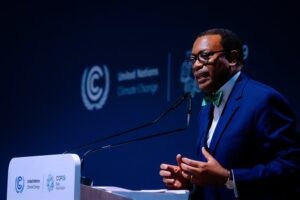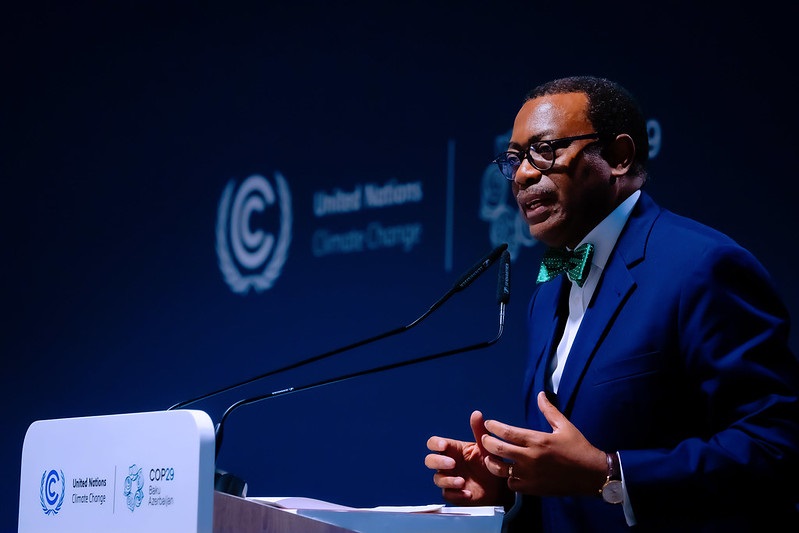- Despite its $6.2Trn natural wealth, Africa remains “green rich but cash poor.”
- Projections show that had carbon sequestration alone been accounted for, Africa’s nominal GDP in 2022 could have increased by $66.1Bn.
- In Europe, carbon prices can reach as high as $200 per tonne, yet in Africa, the same credits are traded for as little as $3 to $10 per tonne.
At the 29th Conference of the Parties (COP29) in Baku, Azerbaijan, African leaders are pushing for a fair valuation of the continent’s natural riches—spanning vast forests, carbon sequestration capabilities, and ecosystem services.
They are calling on authorities to factor them into the calculation of Gross Domestic Product (GDP). This bold move aims to redefine wealth on a global scale by integrating the immense value of Africa’s natural assets into economic frameworks.
In a pivotal communique, African heads of state have cited the invaluable contributions of their ecosystems to global public goods.
“We are doing useful work for Africa and the rest of the world,” noted President Denis Sassou Nguesso of the Republic of Congo, underscoring the need for natural capital to be recognized as integral to an economy’s wealth.
The value of Africa’s natural wealth
Africa’s natural wealth is estimated to be worth trillions of dollars—far exceeding the GDP of many of its nations. A report by the African Development Bank Group (AfDB) cites this disparity: in 2018, Africa’s GDP stood at $2.5 trillion, a figure dwarfed by its estimated $6.2 trillion in natural capital.
Despite this wealth, the continent remains “green rich but cash poor,” as AfDB President Dr. Akinwumi Adesina pointed out.
Preliminary estimates indicate that had carbon sequestration alone been accounted for, Africa’s nominal GDP in 2022 could have increased by $66.1 billion—a sum greater than the combined GDP of 42 African nations.
The question, therefore, is not whether Africa is wealthy, but why this natural wealth is not reflected in global economic measurements.
Carbon credits: A double-edged sword
While Africa’s forests play a critical role in absorbing global carbon emissions, the continent continues to face exploitative practices in carbon trading markets.
At the ongoing COP29 talks, leaders raised concerns over what Dr. Adesina described as a “carbon grab,” where African nations sell carbon credits at a fraction of their worth.
In Europe, carbon prices can reach as high as $200 per tonne, yet in Africa, the same credits are traded for as little as $3 to $10 per tonne.
This gross undervaluation not only shortchanges African countries but also strips them of sovereignty over lands allocated for carbon sequestration.
The AfDB President warned that this practice represents a “lose-lose proposition” for Africa, both economically and environmentally.
Read also: Climate change finance, accounting for “green wealth” top agenda for Africa as COP29 opens
The global alliance for natural capital accounting
To tackle these inequities, African leaders proposed forging a global alliance with other regions, including Latin America, Asia, and the Caribbean, to champion the inclusion of natural capital in GDP metrics.
President Paul Kagame of Rwanda reinforced this vision, stating, “We are not asking for handouts, but for the world to pay for something that has tremendous value for all of us.”
Kenyan President Dr. William Ruto, represented by Prime Cabinet Secretary Musalia Mudavadi, shared similar sentiments, noting that recognizing Africa’s green wealth could unlock financial flows and improve credit ratings, driving much-needed investment into African economies.
A bold agenda for the future
The leaders’ communique also sets the stage for presenting a comprehensive report on natural capital accounting at the African Union’s 2025 summit.
This report will serve as a blueprint for integrating natural capital into GDP calculations, providing a pathway for African nations to reclaim the value of their environmental assets.
The African Development Bank Group has been a key player in advancing this agenda. Its report, Measuring the Green Wealth of Nations: Natural Capital and Economic Productivity in Africa, outlines actionable steps for integrating natural capital into economic productivity metrics.
The bank’s innovative approach to financing and technical support underscores its commitment to helping African nations realize the true value of their green wealth.
Read also: Worsening financial crisis: Africa’s natural resources traded for loans
Africa’s path toward economic justice
The discussions at COP29 mark a critical juncture in Africa’s quest for economic justice. For decades, Africa’s contributions to global sustainability have gone unrecognized, its resources undervalued, and its economies constrained by outdated metrics of growth.
By advocating for the inclusion of natural capital in GDP calculations, African leaders are challenging the global community to rethink how wealth is measured.
This effort is not just about Africa—it’s a call for a more equitable global economic system that values sustainability and recognizes the intrinsic worth of natural ecosystems.
As President Sassou Nguesso aptly put it, this initiative is about accelerating “the recognition of the environmental dividend” for Africa and the world.
The inclusion of natural capital in GDP calculations could transform Africa’s economic narrative. By valuing its natural riches, the continent can attract investments, improve credit ratings, and ensure that its resources are leveraged for the benefit of its people.
COP29 was more than a conference; it was a platform for Africa to assert its role as a global leader in sustainability. As the continent works toward realizing this vision, the world will watch closely—and hopefully, take note of the lessons Africa is teaching about the true meaning of wealth.

